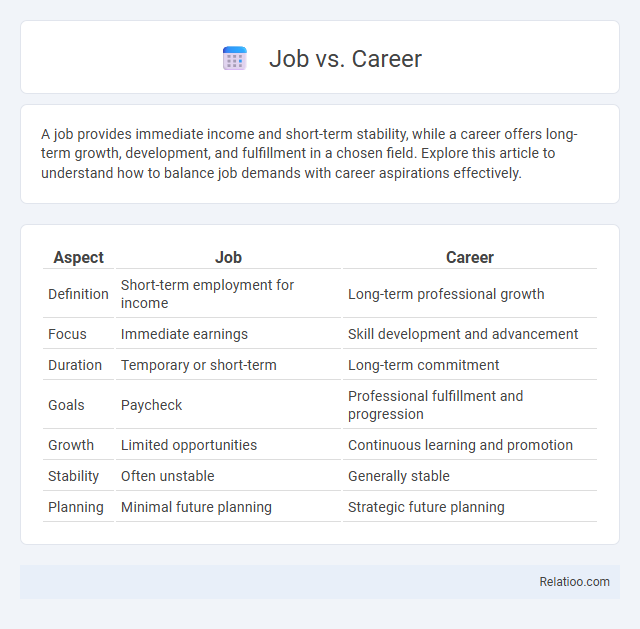A job provides immediate income and short-term stability, while a career offers long-term growth, development, and fulfillment in a chosen field. Explore this article to understand how to balance job demands with career aspirations effectively.
Table of Comparison
| Aspect | Job | Career |
|---|---|---|
| Definition | Short-term employment for income | Long-term professional growth |
| Focus | Immediate earnings | Skill development and advancement |
| Duration | Temporary or short-term | Long-term commitment |
| Goals | Paycheck | Professional fulfillment and progression |
| Growth | Limited opportunities | Continuous learning and promotion |
| Stability | Often unstable | Generally stable |
| Planning | Minimal future planning | Strategic future planning |
Understanding the Difference Between a Job and a Career
Understanding the difference between a job and a career is crucial for long-term professional growth. A job provides immediate income and often involves specific tasks, while a career encompasses a series of connected employment opportunities focused on progressing in a particular field or industry. Your career planning should align personal goals with skill development to transform jobs into a fulfilling, sustainable career path.
Defining a Job: Short-Term Goals and Responsibilities
A job involves specific tasks and duties performed in exchange for payment, often focusing on short-term goals and immediate responsibilities. Your job requires meeting defined expectations within a particular role, emphasizing skills application and task completion rather than long-term growth. Understanding the distinction between a job and a career helps clarify how short-term efforts contribute to broader professional objectives.
What Makes a Career: Long-Term Growth and Development
A career involves long-term growth and development through continuous skill acquisition, goal setting, and professional advancement, distinguishing it from a job, which typically focuses on short-term tasks and income. Career planning is essential for identifying personal strengths, exploring opportunities, and mapping out steps to achieve sustained success and fulfillment. Emphasizing ongoing education, networking, and adaptability ensures a dynamic career path that evolves with industry trends and individual aspirations.
Key Benefits of Having a Job
Having a job provides steady income, enabling financial stability and independence. It offers practical experience that builds skills and work discipline essential for future career growth. Employment also expands professional networks, opening opportunities for career advancement and personal development.
Advantages of Pursuing a Career Path
Pursuing a career path offers long-term growth opportunities, skill development, and increased job satisfaction compared to holding a temporary job. Career planning enables individuals to set clear goals, align their education and experiences with industry demands, and adapt to evolving market trends. Fostering a focused career trajectory enhances financial stability, professional reputation, and access to leadership roles within specialized fields.
Skills Acquisition: Job Versus Career
Skills acquisition varies significantly between a job and a career, as a job typically involves mastering specific tasks or functions to perform immediate duties efficiently, whereas a career demands a broader, ongoing development of both hard and soft skills to advance professionally over time. Your investment in career planning emphasizes continuous learning, adaptability, and strategic skill-building that align with long-term goals rather than short-term job requirements. Focusing on acquiring transferable skills enhances your marketability and prepares you for diverse opportunities within your chosen career path.
Financial Implications: Earning in Jobs and Careers
Your financial stability depends heavily on distinguishing between a job and a career, as jobs often provide short-term earnings while careers offer long-term financial growth and advancement opportunities. Career planning focuses on aligning your skills and goals with market demands to maximize earnings potential over time, incorporating salary progressions, benefits, and investment in professional development. Understanding these financial implications helps you make informed decisions that secure consistent income and build wealth through strategic career choices.
Work-Life Balance: Jobs Compared to Careers
Jobs often provide short-term income with limited growth opportunities, whereas careers offer long-term professional development and personal fulfillment aligned with individual goals. Career planning involves strategic decision-making to balance work demands and personal life, promoting sustained work-life balance and overall well-being. Understanding the distinction between jobs and careers helps individuals prioritize roles that foster job satisfaction and life satisfaction concurrently.
How to Transition from a Job to a Career
Transitioning from a job to a career involves identifying long-term professional goals and acquiring relevant skills through education and experience. Developing a strategic career plan includes setting milestones, seeking mentorship, and networking within the desired industry to enhance opportunities. Consistent skill advancement and aligning work experiences with career objectives transform a temporary job into a fulfilling career path.
Choosing the Right Path: Job or Career?
Choosing the right path between a job and a career involves evaluating long-term goals, personal interests, and growth opportunities. A job typically offers immediate income and short-term benefits, while a career provides sustained professional development, skill advancement, and alignment with one's passion and values. Effective career planning includes assessing market trends, desired lifestyle, and skill set compatibility to make an informed decision that supports future success and fulfillment.

Infographic: Job vs Career
 relatioo.com
relatioo.com